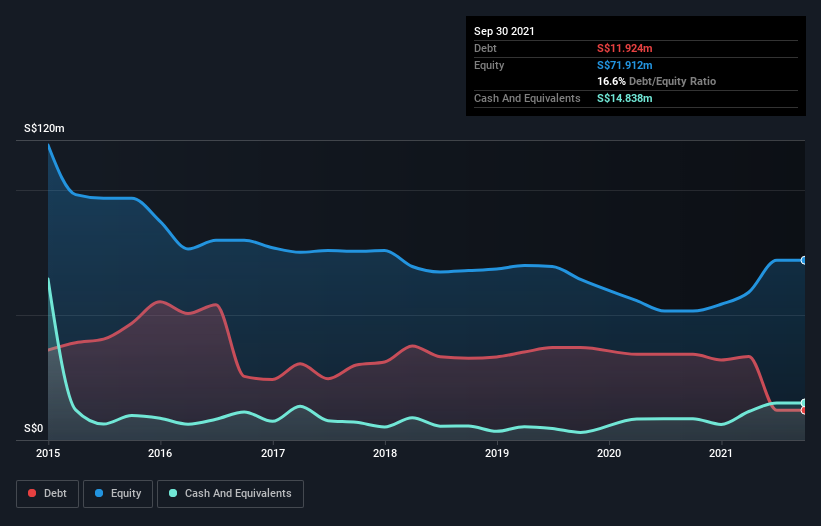Warren Buffett famously said, 'Volatility is far from synonymous with risk.' So it might be obvious that you need to consider debt, when you think about how risky any given stock is, because too much debt can sink a company. We note that King Wan Corporation Limited (SGX:554) does have debt on its balance sheet. But should shareholders be worried about its use of debt?
What Risk Does Debt Bring?
Generally speaking, debt only becomes a real problem when a company can't easily pay it off, either by raising capital or with its own cash flow. Ultimately, if the company can't fulfill its legal obligations to repay debt, shareholders could walk away with nothing. However, a more frequent (but still costly) occurrence is where a company must issue shares at bargain-basement prices, permanently diluting shareholders, just to shore up its balance sheet. Having said that, the most common situation is where a company manages its debt reasonably well - and to its own advantage. When we think about a company's use of debt, we first look at cash and debt together.
See our latest analysis for King Wan
What Is King Wan's Debt?
You can click the graphic below for the historical numbers, but it shows that King Wan had S$11.9m of debt in September 2021, down from S$34.3m, one year before. But it also has S$14.8m in cash to offset that, meaning it has S$2.91m net cash.

How Strong Is King Wan's Balance Sheet?
Zooming in on the latest balance sheet data, we can see that King Wan had liabilities of S$49.9m due within 12 months and liabilities of S$4.35m due beyond that. On the other hand, it had cash of S$14.8m and S$32.4m worth of receivables due within a year. So it has liabilities totalling S$7.01m more than its cash and near-term receivables, combined.
While this might seem like a lot, it is not so bad since King Wan has a market capitalization of S$31.4m, and so it could probably strengthen its balance sheet by raising capital if it needed to. But we definitely want to keep our eyes open to indications that its debt is bringing too much risk. While it does have liabilities worth noting, King Wan also has more cash than debt, so we're pretty confident it can manage its debt safely.
It is just as well that King Wan's load is not too heavy, because its EBIT was down 44% over the last year. When it comes to paying off debt, falling earnings are no more useful than sugary sodas are for your health. The balance sheet is clearly the area to focus on when you are analysing debt. But it is King Wan's earnings that will influence how the balance sheet holds up in the future. So when considering debt, it's definitely worth looking at the earnings trend. Click here for an interactive snapshot.
Finally, a business needs free cash flow to pay off debt; accounting profits just don't cut it. King Wan may have net cash on the balance sheet, but it is still interesting to look at how well the business converts its earnings before interest and tax (EBIT) to free cash flow, because that will influence both its need for, and its capacity to manage debt. Looking at the most recent three years, King Wan recorded free cash flow of 36% of its EBIT, which is weaker than we'd expect. That weak cash conversion makes it more difficult to handle indebtedness.
Summing up
While King Wan does have more liabilities than liquid assets, it also has net cash of S$2.91m. So we are not troubled with King Wan's debt use. When analysing debt levels, the balance sheet is the obvious place to start. But ultimately, every company can contain risks that exist outside of the balance sheet. Be aware that King Wan is showing 4 warning signs in our investment analysis , and 1 of those is significant...
If you're interested in investing in businesses that can grow profits without the burden of debt, then check out this free list of growing businesses that have net cash on the balance sheet.
Valuation is complex, but we're here to simplify it.
Discover if King Wan might be undervalued or overvalued with our detailed analysis, featuring fair value estimates, potential risks, dividends, insider trades, and its financial condition.
Access Free AnalysisThis article by Simply Wall St is general in nature. We provide commentary based on historical data and analyst forecasts only using an unbiased methodology and our articles are not intended to be financial advice. It does not constitute a recommendation to buy or sell any stock, and does not take account of your objectives, or your financial situation. We aim to bring you long-term focused analysis driven by fundamental data. Note that our analysis may not factor in the latest price-sensitive company announcements or qualitative material. Simply Wall St has no position in any stocks mentioned.
Have feedback on this article? Concerned about the content? Get in touch with us directly. Alternatively, email editorial-team (at) simplywallst.com.
About SGX:554
King Wan
An investment holding company, provides mechanical and electrical engineering services for the building and construction industry in Singapore.
Adequate balance sheet with low risk.
Market Insights
Community Narratives



